GTG Links 40 – We're so back: with big tech & AI impacts, Ethiopian petrol car bans, and huuuuuge new climate democracy research

We're back after our extended break, with a post positively overflowing with new news from the last month (!) of climate action.
Before we get stuck in a brief update – we are holding the first of our meetings with already committed and potential founding members of the Sustainable Games Alliance today as we move forward building the framework for a comparable standard for calculating and disclosing game emissions.
I've heard from a few of you already interested in talking about this, so please do reach out if you're on the fence, if you're looking for ways to take action, and want to get involved.
Alright let's get stuck in, as there's lots to catch up on.
Iwata had the spirit of sustainability
"In the end, if the next generation of consoles only represents beefed-up technology, there will not be much of a future."
— Nintendo Memories (@NintendoMemo) February 17, 2024
Iwata Satoru 🫡❤️ (2005) pic.twitter.com/Cj4naLPFLn
Rumours of a PS5 Pro
Contrast Iwata's attitude to the new rumours of a PS5 Pro. We're not too far off the timing for a "mid-cycle refresh" from last generation, but things have changed quite a bit since the PS4 era and I'm left wondering... what could be the selling point on a 'PS5 Pro'? The PS4Pro added 4K and/or 60FPs, but the PS5 already does 8K despite having barely any consumer demand for it yet. It can also output 120Hz so the only thing I can think of is it could beef up raytracing capabilities. Are gamers really after more graphical grunt from the console already? I really can’t think what else it would offer (except more CO2 emissions naturally). Am I out of touch?
Sony is reportedly ‘likely’ to release a PS5 Pro later in 2024 pic.twitter.com/OaYMnfLiXz
— Pubity (@pubity) February 20, 2024
DirectSR simplifying frame scaling?
So this could be a really powerful and positive intervention if it enables devs to incorporate lower frame resolutions more simply. We know what an impact that can have on final end-user energy consumption and emissions, so this seems like a really smart move.

Green cert for CDPR
They got themselves an Eco-management certification - nice!

UKIE Video Games Awards crowns UsTwo Games the (inaugural?) “Sustainability Champion”
I think this is the first time the awards have had a sustainability category – unless I am misremembering. I recall being impressed that Develop Brighton had an award first... which I think UsTwo Games also won (someone correct me if I'm wrong on any of this!). Nice to see more of these though, and hopefully it becomes a trend we see in other regions as more regional associations step up to the sustainability plate. There is still the question of who is doing the judging, and what criterias are being applied – but UKIE has its green pedigree, having put out one of the first guides to making green games waaay back in 2021.
Winner of Sustainability Champion… @ustwogames! pic.twitter.com/88fTyEx131
— Ukie (@uk_ie) March 7, 2024
UK gaming sales stats

Forum posters grabbed these from the Digital Entertainment and Retail Association's new 2024 Yearbook [PDF].
Console hardware numbers
From Game Discover Co Newsletter:
Newly spotted: some data shared by Take-Two which “said 77 million current-gen consoles had been sold as of December 31, 2023”. This implies - if you take Sony’s ‘50 million PS5s on December 9th, 2023’ announce into account, that “PlayStation 5 had outsold Xbox Series X/S by around 2-to-1 as of the end of 2023.”
Bookmarking these figures to drop into my model of the games industry's running total carbon footprint next time I update it.
GDC sustainability-related talks
Check out the spreadsheet put together by IGDA Climate SIG members and RSVP to Microsoft's sustainability mixer. Having flown too much last year (and having all my talk proposals knocked back 😅) I will not be in attendance but please get along if you are in SF later this month!
Post-doc with the STRATEGIES team

An open source SteamDeck
Using parts from the hugely repairable and upgradeable Framework computer/laptop ecosystem, this seems great.

Vizualising the game indsutry layoffs
We're obviously in a baaaaaaad time for the games industry – how bad compared to other periods of downturn? We need more data on the size of the global industry to know exactly what sort of percentage the workforce has shrunk by, but surely it's up there with some of the worst, as this visualisation makes dramatically clear.

Ironically (or perhaps appropriately?) it is the very same lack of data/transparency about total employment across the field that is holding back more accurate emissions estimates for upstream game development emissions.
Nathaniel Bullard’s annual deck of climate stats returns
Literally hundreds of slides here packed with indicators on how the transition is progressing – I'm going to do a bonus GTG Supporter only post next week with some of the most interesting charts from a corporate sustainability perspective. If you don't have time to wade through the 200 (!!) slide deck, join the GTG Supporter tier to get that post delivered straight to your email with some of my commentary and additional context for the games industry.

Big Compute, Big Challenges
A bunch of related pieces have come out in the last month on AI, data centres and computational tech sustainability challenges. The first is on the energy consumption of GenAI potentially equalling that of Spain based on current trends is terrifying.

Bloomberg had a piece on data centres shifting physical locations in the search fpr lower-carbon power sources – but obviously there's only so much you can do if you're also adding a country's worth of extra demand through, say, GenAI.

Environmentally sustainable computing framework
This looks like a useful framework for thinking about reducing compute energy demand, more for enterprise software developers but some of this might be applicable to gaming software engineering – particularly those games that deal with severs and load balancing, etc.

Azure has a new "carbon optimisation" tool as well. Currently in a free "preview" period, here's the list of key features of the tool:
Granular emissions data within Azure Portal - Azure carbon optimization provides granular emissions data up to the resource level from last 12 months’ usage of all your Azure products and services. To view emissions data for your subscriptions, go to the Azure portal and search for Carbon Optimization.
Access based on Azure RBAC: Emissions data access is based on Azure roles. You must be assigned at least one of the owner, contributor, or carbon optimization roles at the subscription level to view emissions data for a given subscription.
Breakdowns by subscription, resource group, resource, service, and location - You can view different pivots of emissions data to understand how your carbon emissions are distributed across different dimensions and extract insights on which dimensions emit the most carbon.
REST APIs and exports - You can also access your emissions data programmatically using REST APIs or export it to CSV to integrate it with other tools or platforms for further analysis or reporting.
Carbon reduction recommendations - Azure carbon optimization provides optimization recommendations that are generated based on your resources’ utilization. The recommendations include switching to more efficient SKUs or reducing idle or unused resources. You can view the estimated carbon savings and cost implications of each recommendation.

AI and water use in data centres
Big, biiiiig new story on this area of data centre impacts that has rapidly rocketed to the top of many sustainability professionals list of main environmental concerns in tech.

Survey of tech professionals finds many are prioritising sustainability over cost
These are some super interesting findings from a ClimateAction.Tech supported survey of tech and sustainability workers. Wanna save money? Prioritise sustainability!
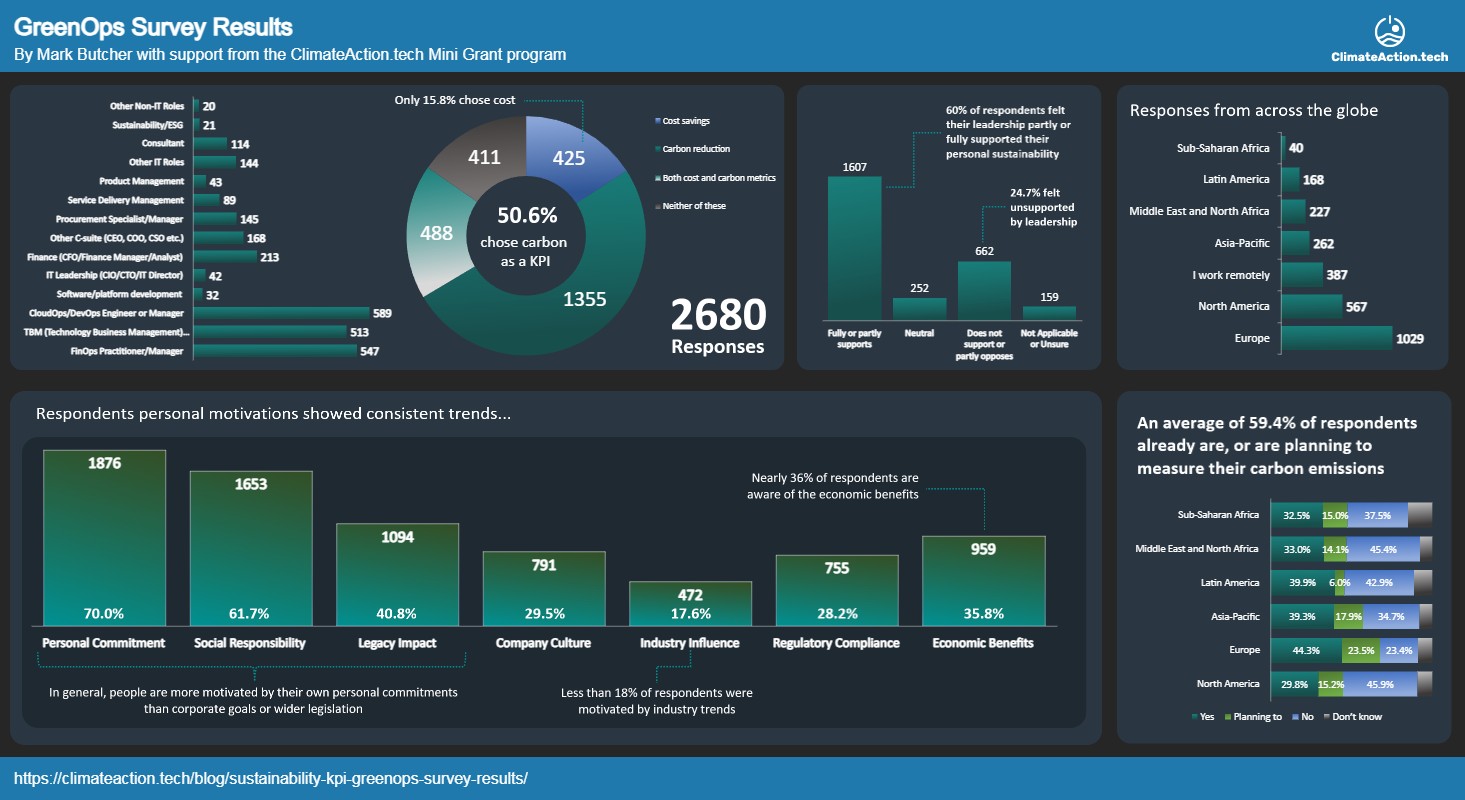
Interesting charts
First some stats from the IEA on VC clean energy investments.
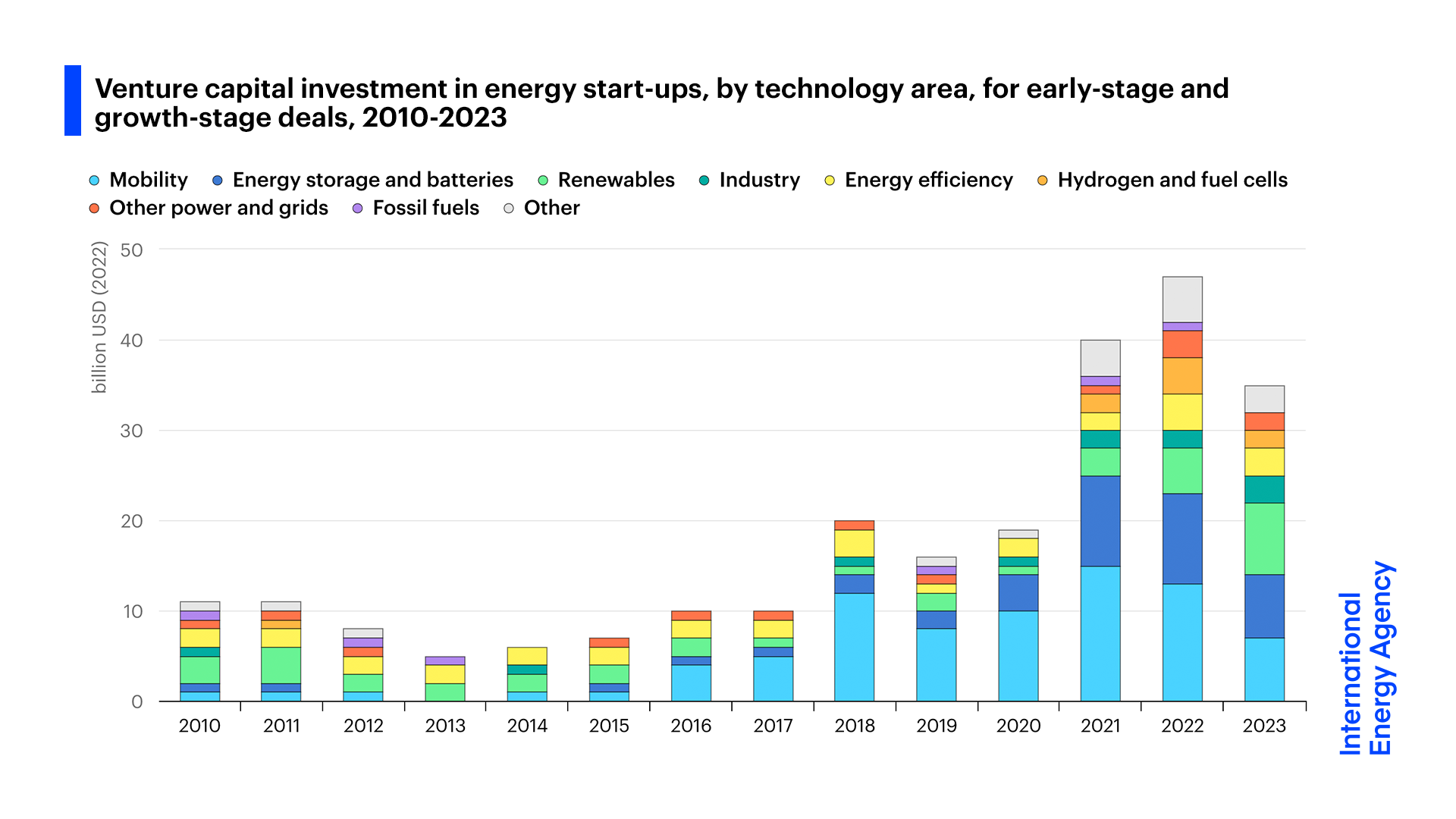
And the second, annual footprints of the world's world's biggest coal plants. The location of most of these will come as no surprise, but Poland's Bełchatów Power Station is a surprising appearance, and a dubious honour for the only European country to appear on the list.
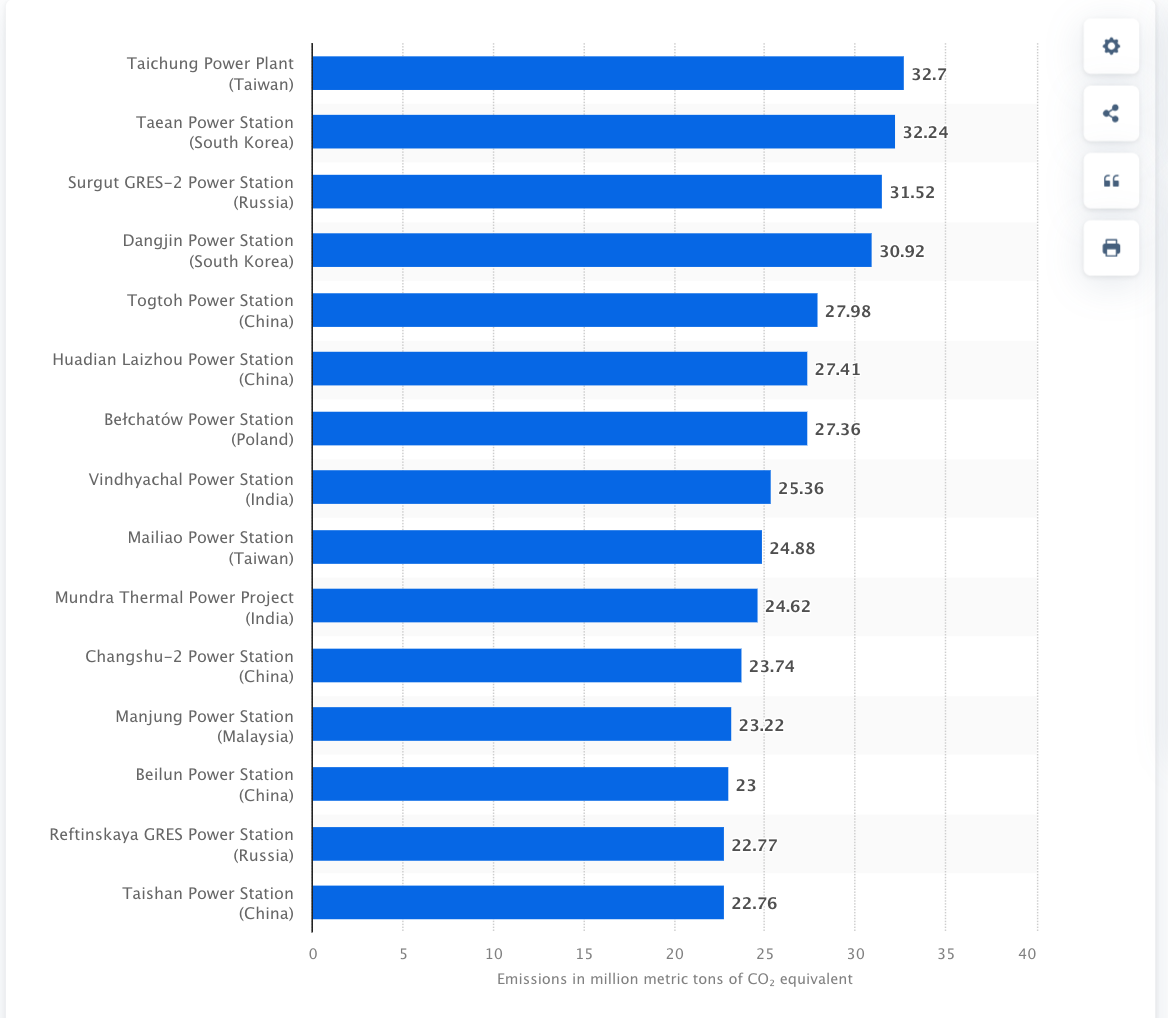
The latest science on coming climate impacts
Scientists are sounding the alarm about approaching tipping points for the AMOC (aka the gulf-stream) – which could bring much more freezing weather to parts of Europe and the northern hemisphere.
In more encouraging news, a new worldwide study (published in Nature no less!) finds overwhelming support across the world for climate action – even a willingness to sacrifice a fraction of their income to see action.
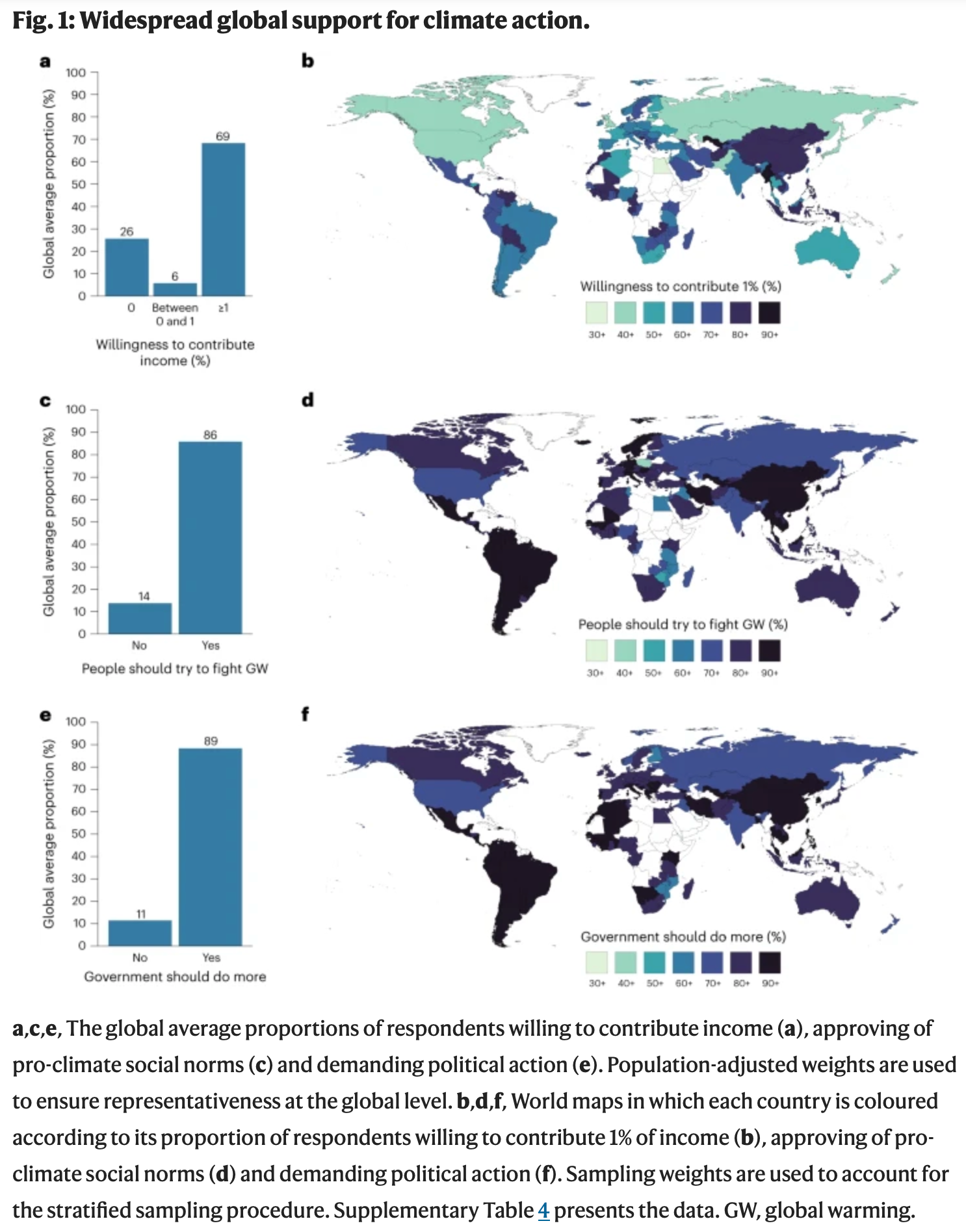
The strongest factor impacting willingness to act on climate seemed to be whether or not someone lived in a hotter climate, and whether respomdemts lived in areas of high climate vulnterability.
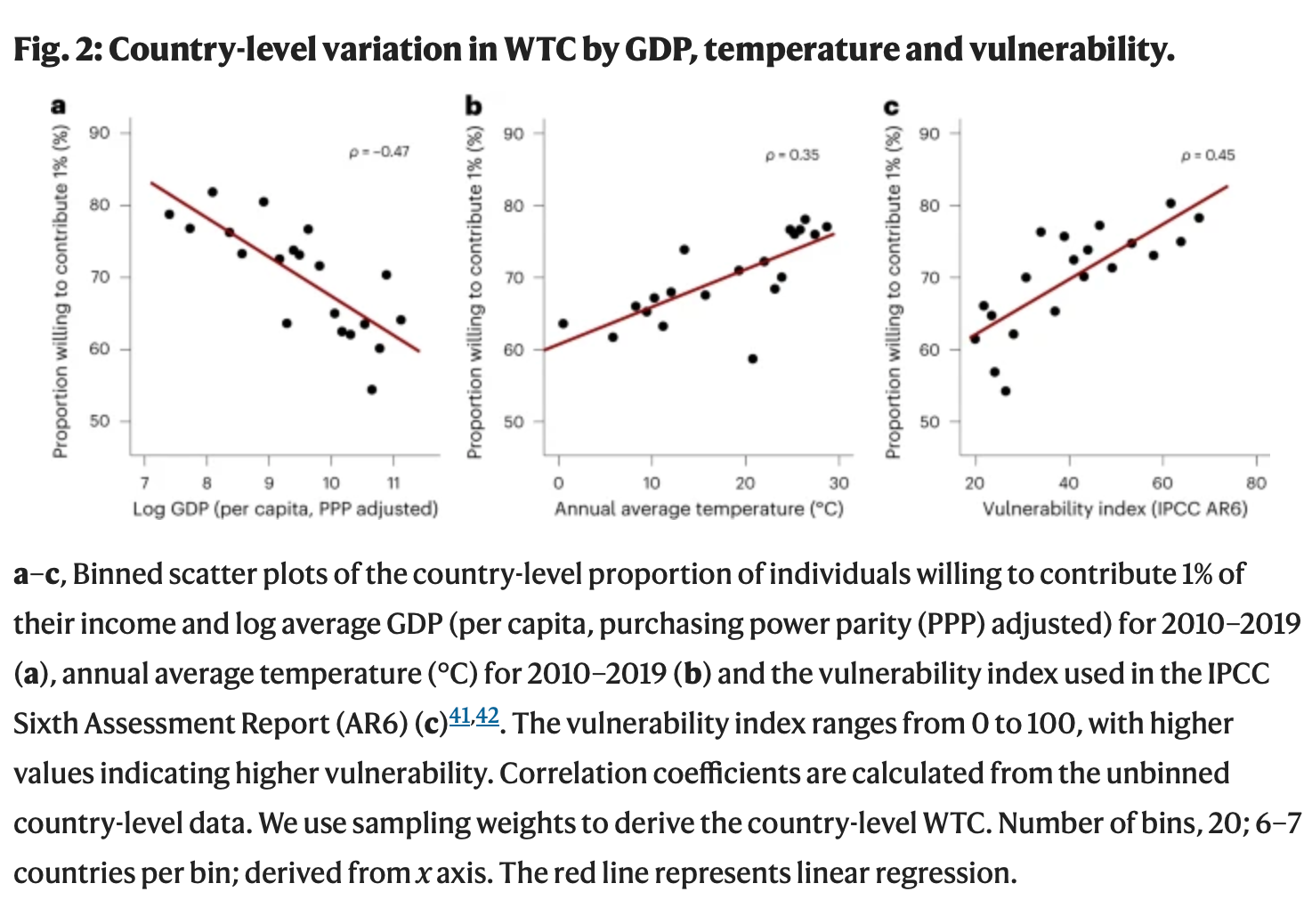
The researchers asked a question about contributing 1% of monthly income to climate, which becomes a "willingness to contribute" (WTC) factor that then shows some more veeeeery interesting results:
Figure 3a shows a strong and positive correlation between the country-level proportions of individuals willing to contribute 1% and the corresponding average perceived proportions of fellow citizens willing to contribute 1%. (Empahsis added)
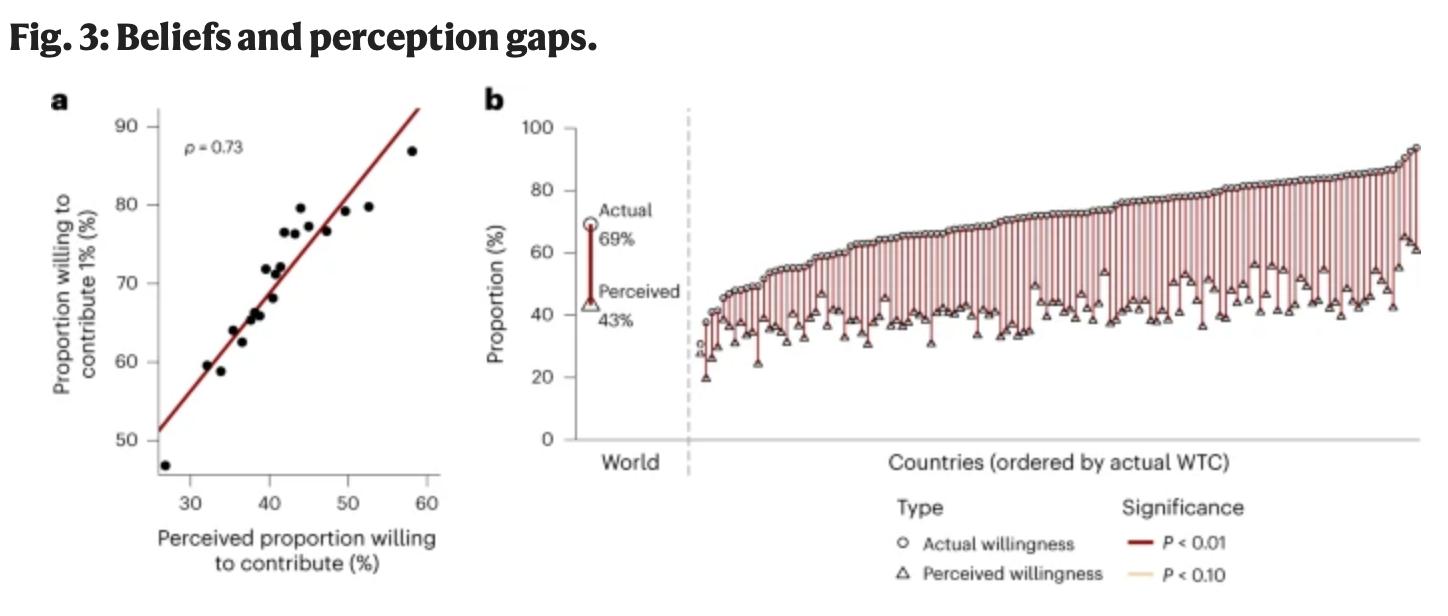
So here's the thing – the more likely people are to percieve their fellow citizens as being willing to contribute, the more likely they are to also be willing to contribute.
This is significant not because we should try and have a 1% climate tax, but because as the authors state:
In a representative US sample, respondents who state they would be willing to contribute 1% of their monthly income donate 43% more money to a climate charity... and are 21–39 percentage points more likely to avoid fossil-fuel-based means of transport (car and plane), restrict their meat consumption, use renewable energy or adapt their shopping behaviour.
There's heaps of other great insights in this piece, but the big ticket takeaway for me is that actual worldwide support for action on climate is overwhelming. Once again, the problem is not people's views it’s far more a lack of representation of those views at the levels of decisionmaking that matter. Another way to describe this is as a lack of democracy. If we truly lived in democracies, our govt policies would reflect this, but they dont, and this is hardly the only issue. (Cf: the huge majority of people, even in the US that have supported a ceasefire in Gaza for months and months, and yet...)
Ethiopia bans petrol/diesel vehicle imports
Speaking of representative climate action, how good is this?

Pricing in climate risk - and governments footing the bill
In November, the US Treasury for the first time requested granular data to assess the “increasing impacts” of climate change on household finances, citing “insurer pullbacks and significant premium increases in several states”. At the same time, two senators launched an investigation into how insurance companies are navigating climate risks, including asking firms for five-year forecasts of premium rates and inquiring whether they are considering exiting any markets. Senior industry executives fear that the relationship between insurers and regulators is weakening. Whether companies are pricing fairly is an important and long-running discussion between the parties. Eric Andersen, president at New York-listed broker Aon, says the relationship “is breaking down more and more”. The question now, say industry experts, is not whether governments will have to step in, but how much further they will have to go. Already, a lot of tail risk is sitting with governments that have obligations to stand behind the various and growing local and national programmes. Australia has launched a public scheme to absorb some cyclone-related risks. Some politicians and industry figures have called for the US to adopt a federal-level insurance backstop for climate risks. The UK’s flood reinsurance scheme is due to expire in 2039, but increasingly executives expect it will have to continue beyond that date. Last year the scheme’s then chair said that government spending on flood defences would have to go “further and faster”
From here (paywalled): https://www.ft.com/content/ed3a1bb9-e329-4e18-89de-9db90eaadc0b
And that's all! Till next time.











